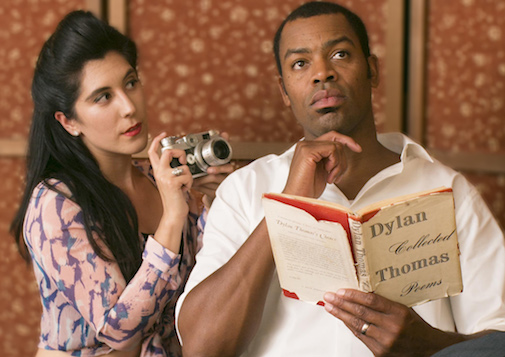The new opera by Bay Area team, librettist Claudia Stevens and composer Allen Shearer, ran this past weekend at Z Space in San Francisco as part of Earplay’s 2019 season. Howards End, America is based on the 1910 novel by E.M. Forster, and the opera is an ambitious endeavor, librettist and composer opting not only to set a complicated and subtle story but also to place it into a milieu that is easily read by contemporary Americans as familiar and pertinent to their lives.
Set in 1950s Boston, the opera moves swiftly and compactly through the story of three families, each from a different class background and with conflicting aspirations, but all interacting to determine each other’s futures for good or for ill.

That is managed theatrically by short scenes impressively staged by Director Philip Lowery and aided by a complex series of images assembled by Jeremy Knight and projected on multiple screens that seamlessly shift the narration from the streets of Boston to the sea frontage of Howards End, and from the glass wall confinements of the Wilcox bank to the stark apartment of Leonard and Jacky Bast.
Just as the libretto zips from scene to scene, the music requires full attention from audience and musicians. Not only is Shearer’s composition style complex in itself, but it also blends in a number of musical genres, rolling out quotations from Beethoven’s Ninth one moment in a charming scene where Helen Schlegel and Leonard Bast secure their friendship by singing post-concert excerpts about Germanic brotherhood in the streets of Boston, followed some short scenes later by Jacky Bast singing “Ain’t Misbehaving” and “Lady Be Good” to the radio. Candace Johnson, who sang the jazz club singer Jacky, commented in the pre-show talk that the naturalness of the composer’s intertwined score allowed her to effortlessly improvise the jazz songs, changing the emphasis and style of her delivery.
The opera’s production was also blessed to have Earplay, one of the Bay Area’s premier new music ensembles, playing the score, under the baton of Music Director Mary Chun. Good thing. The music demands unswerving attention from the musicians, with a richness that barely allows a moment’s hesitation.
The singers were also ably talented, and most were familiar faces and voices in the Bay Area’s many performance houses.
Bass-baritone Philip Skinner and baritone Daniel Cilli sing the roles of Henry and Charles Wilcox. The Wilcoxes are an ultra rich family with narrow ideas and a set of double standards that makes upper-class Edwardian English hypocrisy seem sensible. Paterfamilias Henry’s verdict that the world is made of winners and losers seems chillingly familiar. Ruth, Henry’s ailing wife who requests Howards End be given to the sympathetic Margaret Schlegel, was sung by mezzo Erin Neff. If I had one request to make of the opera it would be to lengthen Ruth’s moving first-act aria in which she tells of her love for her home, Howards End. Throughout I wanted the magnetic power of place to haunt the characters’ actions more vividly. Perhaps it did musically, and I missed that on first hearing.
The Schlegel sisters, Helen and Margaret, are affluent and liberal. Their artistic pursuits and egalitarian impulses allow them a generosity that the Wilcoxes abhor. Nikki Einfeld, a former Adler Fellow, scaled the dauntingly high role of Margaret with aplomb, and Sara Duchovnay added warmth to the role of Helen.
Tenor Michael Dailey sung Leonard Bast, the struggling African American poet who is out of step with his jazz-singing wife Jacky, though both aspire to recognition and the financial securities recognition is believed to bring. Dailey added a vocal freshness and innocence to the character. Johnson was vivacious as Jacky – at times joyful, at times seductive.
Where Forster’s novel is a vector for criticism of the rigid class system of England at the end of the 19th-century, Howards End, America strives to look at the racial inequities that are so deeply rooted into our culture along with our own form of class system based on money and held in place by fear and an inability to be generous in a world where resources are believed limited. But love, we know, is an unlimited resource.
– Jaime Robles
